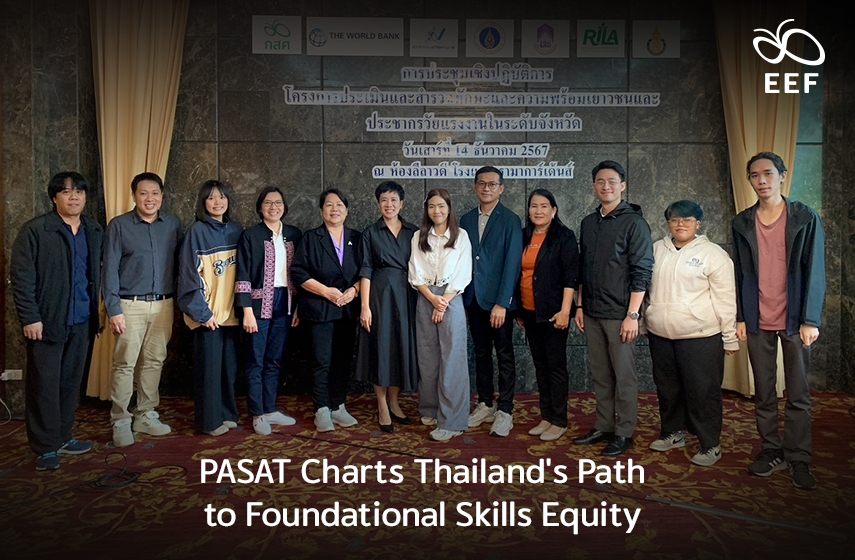
With a bold vision to bridge educational and workforce skill gaps across Thailand, the Provincial Adult Skills Assessment in Thailand (PASAT) initiative brings together multi-sectoral partnerships, cutting-edge technology, and provincial expertise to lay the groundwork for sustainable growth and equity. On December 14th, 2024, the Equitable Education Fund (EEF) Thailand and the Institute for Population and Social Research (IPSR), Mahidol University, serving as the central support for the PASAT initiative, joined forces in hosting a preparatory workshop at Rama Gardens Hotel in Bangkok. Aimed at charting the course for PASAT field surveys, the workshop trained 46 participants — including provincial statisticians, academics, and local education managers — in navigating PASAT’s cutting-edge online platform. Anchored in international standards, this platform equips users to assess youth and workforce skills, enhancing proficiency in advanced academic tools and data management systems.

Laying the foundation for this development were the 2022 Adult Skills Assessment in Thailand (ASAT) report, released at the high-level policy forum “Fostering Foundational Skills for a Sustainable Future of Thailand” on February 21st, 2024, and the PASAT pilot surveys in March 2024. The forum, a collaborative effort between the EEF Thailand, the World Bank, and key Thai institutions — including the Ministry of Interior (MOI), Ministry of Labor (MOL), Ministry of Education (MOE), Ministry of Digital Economy and Society (MDES), the National Statistical Office of Thailand (NSO), and Thammasat University — underscored the urgent need for provincial-level assessments of foundational skills, such as literacy, digital, and socio-emotional skills, essential for daily living, employment, and economic mobility.

This call to action set the stage for the PASAT initiative, which launched in three pilot provinces: Phayao, Pattani, and Rayong. In each province, a dedicated team emerged to drive the initiative: the Phayao City Unit under the University of Phayao, the Faculty of Islamic Sciences at Prince of Songkla University Pattani Campus, and the Rayong Inclusive Learning Academy (RILA) under the Rayong Provincial Administrative Organization. These teams, collaborating with provincial statistical and labor offices, as well as local civil society and academic sectors, took their first steps by reviewing local education and labor conditions. They convened stakeholders for orientation, while preparing survey teams for community-level data collection. This groundwork laid a solid platform for advancing the PASAT initiative, paving the way for deeper engagement at subsequent workshops and training sessions.

At the workshop, the paramount significance of integrating provincial insights with national findings was underscored. Ms. Thanthida Wongprasong, Director of the Office of Innovation for Learning Opportunity at the EEF, stressed that this integration would fuel human capital development plans tailored to local contexts. To achieve this, high-quality, evidence-based data must be leveraged, requiring the specialized expertise of provincial statistics and labor offices alongside local networks. Introducing the PASAT platform’s features, Assoc. Prof. Dr. Piyawat Kaetwongsa and IPSR facilitators guided participants through its three subsystems: interviewer, fieldwork supervisor, and fieldwork manager. Demonstrations of each subsystem highlighted their functionality, enabling participants to grasp how these components would streamline data collection and management processes. Hands-on practice followed, generating valuable user feedback that informed technical refinements in preparation for the pilot field surveys planned for December 2024 to January 2025. These pilot surveys will be followed by full-scale surveys, targeting around 1,800 participants per province across diverse locations from January to March 2025.

The initiative faces the challenge of uniting multi-sectoral partnerships, a task requiring collaborative effort to co-design and implement the survey process with precision. Central to this endeavour is fostering robust data management skills among local teams, for only through such empowerment can information be strategically harnessed. Strategically harnessed information, in turn, serves as the cornerstone for crafting human capital development strategies tailored to regional needs. By enhancing regional productivity, these strategies pave the way for sustainable growth, a vision realised through a collective commitment to addressing inequality. This holistic approach aligns seamlessly with the mission of the EEF, which aims to reduce education inequality through research, collaboration, and support for children, youth, and adults in need.
For further information, please refer to
https://www.eef.or.th/wp-content/uploads/2024/02/asat_th_100724.pdf

